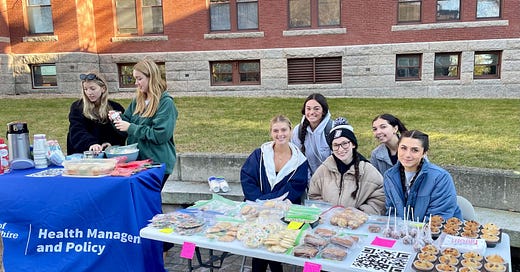Greetings from The University of New Hampshire! My fabulous students had a bake sale yesterday. Nothing like cocoa and cookies! You know what would be good with some of those baked goods would be coffee. But as of Monday, I’ve decided to cut back my coffee intake. I’ve been having some stomach issues, probably due at least in part to my coffee consumption, which is excessive - somewhere in the vicinity of 10-12 cups a day. I kind of just drink coffee all day. Or at least I used to until Monday. Monday I had the equivalent of about 2 cups. I woke up Tuesday morning with a spiking headache, which is unsurprising. But also with what I’d like to call anxiety, but that’s not quite right. The feeling was a looming sense of doom, specifically I had a feeling that I had done something terribly wrong and someone was going to come punish me for it. Does everyone feel like that when they try to dial back their coffee? (Just to clarify, I haven’t done anything terrible, at least not recently.) Hopefully I can stick with the new regime (2-3 cups a day) and the sense of doom will diminish.
As usual, willing good for all of you! Have a cup for me!
**
Read
What: Newsweek, Companies Are Quickly Firing Gen Z Employees
https://www.newsweek.com/companies-are-quickly-firing-gen-z-employees-1958104
Why: I teach Gen Z. I agree with the conclusion of this article:
The solution is not to stop hiring people fresh out of school but instead change how education and professional development are viewed, he added.
"Companies are failing workers by not taking responsibility for training and hoping that a college degree can substitute," Driscoll said. "It never has and, in our current system, it never will."
As you know, we do a lot for our students to help them to learn how to behave in a professional setting. I feel for the vast majority of college students who don’t get that kind of attention. But even some of my students struggle. Helping a young person make the transition from school to work requires understanding the life stage they are going through. We all did it, more or less well. Helping a kid through that transition is a way of paying back the people who did it for you.
**
What: Marginal Revolution, Prediction Markets for the Win
https://marginalrevolution.com/marginalrevolution/2024/11/prediction-markets-for-the-win.html
Why: Prediction markets are places where you can bet on future events, like the presidential campaign. You bet real money, and you can make or lose real money if your predictions are right or wrong. The prediction markets accurately gauged the outcome of the presidential election when the poles were a muddled mess. There’s a commonality between poles and prediction markets - both are trying to get people to reveal their beliefs. Prediction markets reward (with cash) true beliefs, whereas there are no incentives for truth in poles (the shy Trump voter effect). It will be interesting to see if prediction markets gain more traction in news stories in the future.
**
Watch
What: TED, Mastering the Art of the Interview (11 min)
Why: This talk is less about the interview and more about finding person-job fit. Still, I think it was very good. She highlights three rules:
Clarify non-negotiables (work, plus outside of work)
Identify your strengths - uncover with experience
Find alignment through research
I plan to use this with my students. Check it out!
**
Listen
What: EconTalk, Terrorism, Israel, and Dreams of Peace (with Haviv Rettig Gur) (126 min)
Why: It’s been a while since I shared something from EconTalk. Roberts (the host) moved to Israel 3 years ago, and continues to live there, despite the ongoing war. He’s done a number of interviews talking about what is going on in Israel, bit I have skipped most of them because, to me, he’s too close (literally and figuratively) to what is going on. I’m glad I listened to this one. There were some interesting insights into the founding of Israel after WWII, none of which reflect well on America or the West, but do explain something about the attitudes of Israelis. Most of this is toward the end, but the whole thing is interesting, if long.
**
What: Honestly, Peter Thiel on Trump, Elon, and the Triumph of the Counter-Elites (116 min)
Why: What can I say, I like long podcasts. But you already knew that if you’ve listened to any of mine. But I really like listening to Peter Thiel, and just under two hours is just fine. I’m still trying to understand the Trump phenomenon, and Thiel seems to have just about the right distance, plus he should be, by identity, part of the Progressive elite. So he brings that insight as well. He supported Trump’s campaign financially in ‘16, but not in ‘24, which I think is interesting, despite the fact that he believed he would win. Worth a listen.




